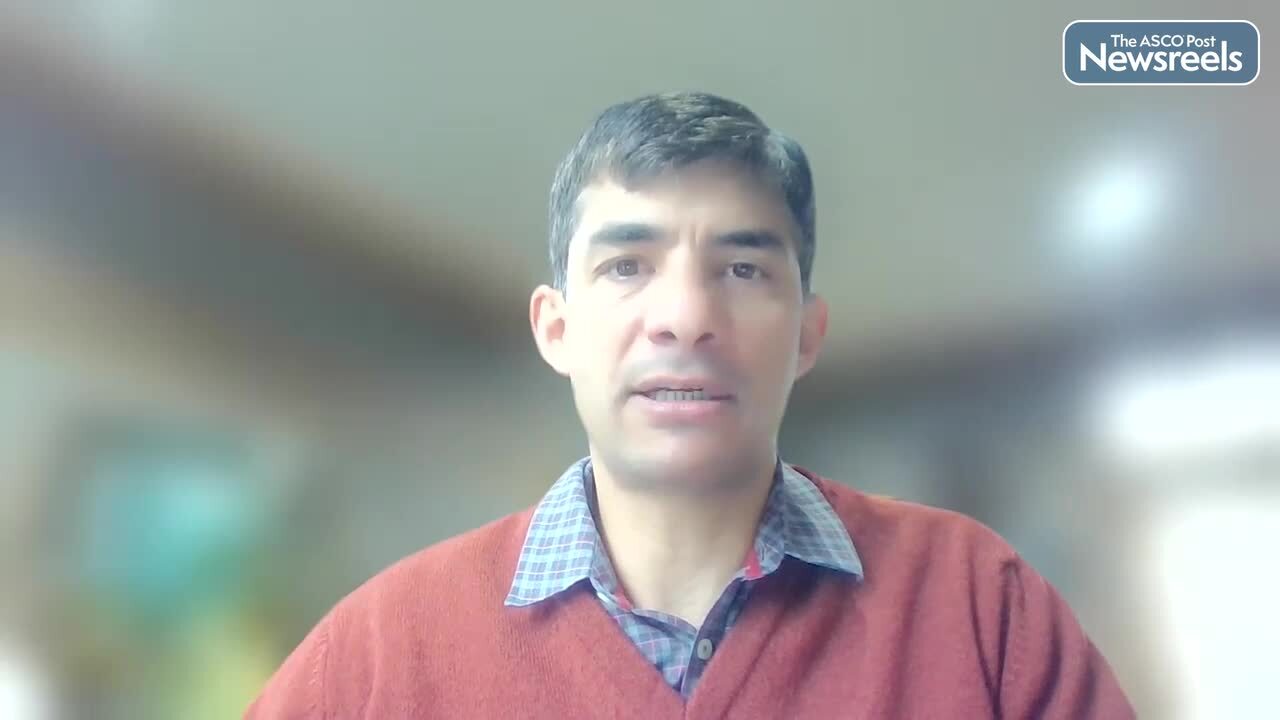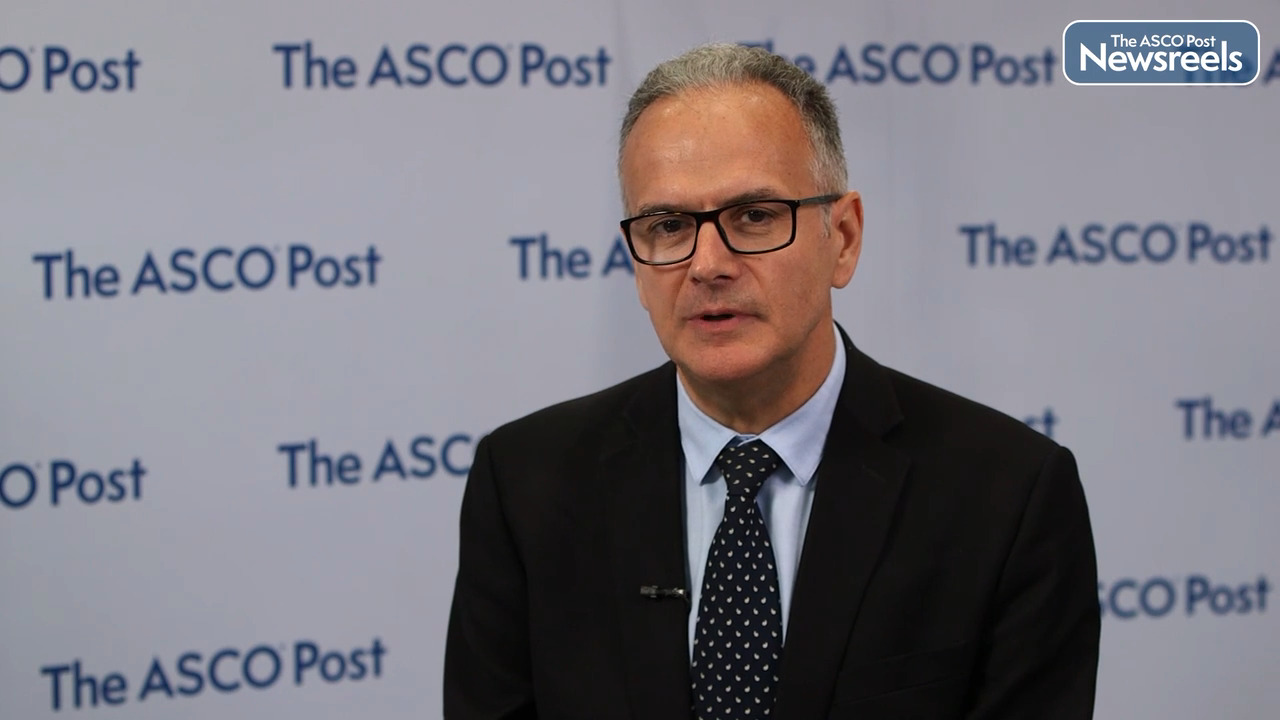Thierry Conroy, MD, on Rectal Cancer: Long-Term Results on mFOLFIRINOX vs Preoperative Chemoradiation Therapy
2023 ASCO Annual Meeting
Thierry Conroy, MD, of the Institut de Cancérologie de Lorraine, discusses phase III findings from the PRODIGE 23 trial, showing that neoadjuvant chemotherapy with mFOLFIRINOX followed by chemoradiotherapy, surgery, and adjuvant chemotherapy improved all outcomes, including overall survival, in patients with locally advanced rectal cancer compared with standard chemoradiotherapy, surgery, and adjuvant chemotherapy (Abstract LBA3504).
Transcript
Disclaimer: This video transcript has not been proofread or edited and may contain errors.
Prodige 23 is a phase three randomized trial that we perform in France in 35 centers. And we have presented the seven-year result of that study. And we confirm all the benefit we had in this study, and we already published. It was a comparison between the standard of care preoperative chemoradiation ventium surgery and six month of adjuvant chemotherapy in patients with locally advanced rectal cancer. And we compare it to three month of induction chemotherapy using the modify Folfirinox regimen than preoperative chemo radiation TME and three month of adjuvant chemotherapy. All patients receive six month of chemotherapy.
We have now a follow-up of 82 month. It means quite seven year, and we confirm a very important reduction of metastases as from 10%. We have still a benefit in the primary endpoint, which is DFS. Also benefiting cancer specific survival. One important point is that we had no increase in local relapse in the experimental arm, which is lower than 5%. And the other point is that the survival at metastatic disease was exactly the same in the two arms, and it was not reduced in the experimental arm.
We had an overall survival benefit, and this is the major point of this study, as we had the 7% overall survival benefit when quality of life improve faster and higher levels in the experimental alarm. To conclude, this is the very positive trial and very good news for patients. The next step will be to know if with induction chemotherapy with Folfirinox some patients may not receive chemo chemo radiation, especially in case of good response to induction chemotherapy. The other point is to know if induction chemotherapy will increase the rate of organ preservation.
Related Videos
The ASCO Post Staff
Shilpa Gupta, MD, of Cleveland Clinic, discusses the results from the EV-103 study and the unmet need for effective first-line therapies in cisplatin-ineligible patients with locally advanced or metastatic urothelial carcinoma. After nearly 4 years of follow-up, the trial findings showed that enfortumab vedotin-ejfv plus pembrolizumab continues to demonstrate promising survival trends with rapid and durable responses in this population (Abstract 4505).
The ASCO Post Staff
Muhit Özcan, MD, of Turkey’s Ankara University School of Medicine, discusses phase II findings from the waveLINE-004 study. It showed that the antibody-drug conjugate zilovertamab vedotin had clinically meaningful antitumor activity in patients with relapsed or refractory diffuse large B-cell lymphoma (DLBCL) who experienced disease progression after, or have been ineligible for, autologous stem cell transplantation and/or chimeric antigen receptor T-cell therapy (Abstract 7531).
The ASCO Post Staff
Shailender Bhatia, MD, of the University of Washington and Fred Hutchinson Cancer Center, discusses phase I/II results on the efficacy of nivolumab with or without ipilimumab in patients with recurrent or metastatic Merkel cell carcinoma. The study found that, for this rare and aggressive skin cancer, nivolumab showed clinical activity in advanced disease. However, these results from CheckMate 358 do not suggest an additional benefit with ipilimumab added to nivolumab (Abstract 9506).
The ASCO Post Staff
Cathy Eng, MD, of Vanderbilt-Ingram Cancer Center, and Thejus Jayakrishnan, MD, of the Cleveland Clinic Taussig Cancer Institute, discuss significant differences in the citrate cycle, a core pathway of cellular metabolism associated with colorectal cancer. Metabolomic differences impacted by environmental exposures (arginine biosynthesis and dietary red meat) were also noted, suggesting possible links with younger age of onset in this disease (Abstract 3510).
The ASCO Post Staff
Alberto Bossi, MD, of Institut Gustave Roussy, discusses phase III findings showing that combining prostate radiotherapy with systemic treatment did not improve overall survival in men with de novo metastatic castration-sensitive prostate cancer and low metastatic burden. However, best outcomes (radiographic progression–free-survival and overall survival) were observed in men receiving the standard of care plus abiraterone acetate plus prednisone with radiotherapy (Abstract LBA5000).





